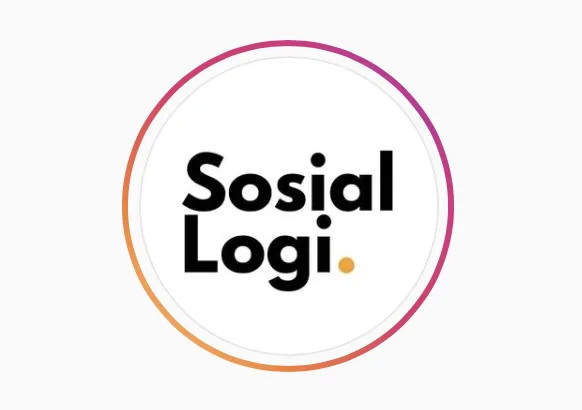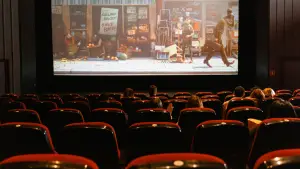Discover Learning Behavior with Sociology and Social Media
“I just want to say, so happy that there’s an account like this,” said one of the followers of @sosiallogi on Instagram. I have been accompanying sociology students for 11 months to study at Sosial Logi, an account on Instagram and Facebook dedicated to help solve the sociology students’ important problems.
I then, over there, became friends with sociology students from various regions. Sometimes, I assist them in understanding the various contemporary sociological ideas and theories, discussing issues in the country, studying good and scientific research practices, and drawing up study plans.
In this article, I will tell you how Sosial Logi was formed and continues to evolve. Sosial Logi was made by means of grounded theory methodological thinking. Therefore, this article also demonstrates how grounded theory can be used to find ways of teaching that are relevant and work well.
Preconceived Student Problems and Solutions
I started non-profit work in March 2020 that focused on college-level sociology learners. My job was to make podcast episodes. The name of the podcast was Sosiologis! Podcast. The goal was simple, which was to disseminate contemporary sociology in Indonesia. I presented summaries of global sociological texts in a relatively short time.
Why was the goal like that? Because I believe that there is a serious problem with Indonesian sociology students. In general, they do not keep up with sociological developments at the global level. They tend to rely on old theories. The way they speak, explain and predict social phenomena is wearisome. The theories they use are the same. Sometimes, it seems like they are pushing their theory too far to explain the reality that is being discussed.
Beginning the Sosial Logi Podcast Sosiologis!
I guess it all happens because Indonesian sociology lacks reading material. Even if there are new sociology books, they are delivered in English. Meanwhile, not all students understand English well. Because of this, they usually rely on old Indonesian sociology books (which are less up-to-date with research developments) that are constantly being printed.
The podcast was chosen as a learning medium because it presents as an emerging trend among students. In early 2020, the number of podcasts in Indonesia was increasing. I guess it will be just as popular as YouTube has been in recent times.
Podcasts have also been used for teaching and learning in Indonesia. Several domestic students and teachers use them to share their materials and assignments. That is a good indication that podcasts can be used as a learning medium. Therefore, starting a podcast of sociology lessons is not such a bad idea.
Sosiologis! Podcast was well received by Indonesian sociology students. Lots of people shared their early episodes in the first season. This podcast was also covered by popular media and received support from some academics to continue to grow.
At one time, I noticed a decrease in the number of podcast listeners. While in my head at that time were just questions: Did I do something wrong? Didn’t I focus on an important issue in Indonesian sociology? It turned out that both the issue and solution I considered significant were insignificant for sociology students.
Let the data show the problems
I reviewed the podcast audience statistics on Anchor.FM and Instagram along with audience engagement experiences on Instagram. From that point, it appears that episodes which clarify the disciplinary practice and scientific status of sociology, as well as various kinds of sociology jobs, have more listeners than episodes of biosocial, historical sociology, relational sociology, and analytical sociology.
This difference indicates that students were not in need of abstract and theoretical material from contemporary sociology. They were not in need of thought or additional knowledge that is equally abstract.
The data shows what is it like to be a sociologist, what skills need to be acquired, what kind of jobs are available, and how much money can be made from a sociology degree are more important than the latest theories and research for Indonesian sociology students. I just realized that so far the Sosiologis! Podcast’s focus has been less relevant to them.
My awareness of that issue required me to make an important decision: do I need to stick to my goals in the beginning, or should I help students solve their problems? Sosial Logi was born because I took the second decision. I wanted to have a more tangible contribution than ever before. In this way, my sociological work turned out to be much more relevant and effective. Then, Sosiologis! Podcast was eventually rebranded as Sosial Logi.
Finding the core variable and its sub-variable
In early November 2020, I decided to change Sosiologis! Podcast to Sosial Logi. Changing the brand was easy. The hard thing was to find the right ways to keep my content remains relevant to Indonesian sociology students.
To that end, I re-observed the engagement statistics and experiences on Anchor.FM and Instagram. However, this time, the goal has changed. Previously, observations were done to identify students’ main concerns and how they resolve them (core variable). But now, I gather data to achieve a theoretical saturation by finding sub-variables and the links between them. Is it possible to reuse statistics and engagement data? Yes, of course, because of the principle of “All is data.”
Starting from that point, I wanted to know what forms of content students were interested in. Thus, the data that I collected focused on content that students were interested in. At least three important notes were obtained:
- Sociology students preferred content that shows the identity of sociology to abstract thoughts, concepts, and theories.
- Based on the reach, Instagram’s contents were easier to share than the podcast episodes. The use of this visual learning media had been proven to be much more effective in providing and spreading lessons, which were not easily accessible to students, than podcast ever had.
- Based on the delivery, the first episode, with a light language and clear direction, was much more listened to than the abstract ones like relational sociology and analytical sociology.
Therefore, I decided to focus on Instagram and minimize the production of podcast episodes as well as to create content in a much simpler language and with a discussion that is relevant to students’ daily lives. Posting a sociologist profession seems to be receiving a positive response as well. Well, since then Sosial Logi has been growing rapidly.
There are other ways to get data: observations during and after testing. I once tested whether sociology students were interested in international socio-political news, whether they like reflective content, and so on. This method is important to get deeper data on the form of teaching materials they like and their various ways of thinking. And sometimes, I got unexpected data.
For example, when I tested whether language-simplified research news in Instagram Story was effective or not. At that time, I reported research on same-sex parenting effects on children’s well-being. Apparently, some students just ignored the results of the study because they did not conform to the religious values they embrace. Some of them also directly showed the real differences between “Western values” and Indonesian “noble values.” Their responses indicate that they have internal barriers to learn sociology. So, more tests are needed on how to create and deliver the right learning materials in confronting their barriers.
Develop your “grounded theory”
As far as I keep collecting and comparing data, I know my job is not only as a content creator that helps students learn practices of contemporary sociology, but also serves them to discuss so they can find their career path. I have held several brief discussions via Instagram Story without discriminating against any student’s views. The principles are to accommodate differences, provide space for them to speak out, and facilitate the exchange of ideas. I have also opened a private discussion room several times for them to ask anything they want to ask. In there, I gave them study advice or readings so that they would continue their interest in a topic.
Based on my experience in Sosial Logi, thinking like a grounded theorist can help us find relevant and effective best teaching practice in the field. At the same time, it continues to develop as the data is increased and compared.
With open-mindedness from the beginning (which did not impose our focus on students) and constantly compare the data, we can find the student learning pattern. Once we know the learning pattern, we can focus on deepening it by focusing the data collection and analysis (theoretical sampling). We can find the real learning pattern in students, whether it is in the form of an ideal-typical pattern, strategy pattern, level pattern, or other forms of pattern.
What kind of pattern is best used? Only the data knows. Do not speculate. Let the data guide us to find the best teaching practice for students.
Note: this is Glaser’s grounded theory







